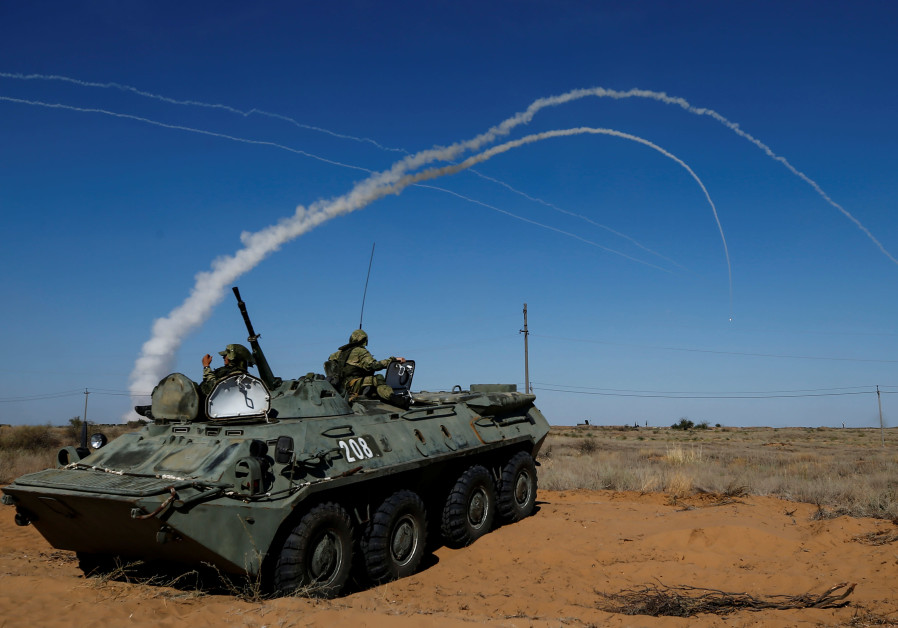Syrian officer: Russia’s S-300 system minimizes success of Israeli strike

Russian servicemen rest on top of an armoured personnel carrier (APC) as S-300 air defense missile systems launch missiles during the Keys to the Sky competition at the International Army Games 2017 at the Ashuluk shooting range outside Astrakhan, Russia August 5, 2017. (photo credit: MAXIM SHEMETOV/REUTERS)
The deployment of Russia’s advanced S-300 anti-aircraft systems to Syria has minimized the chances of Israeli air strikes, a senior Syrian officer said Thursday.
“There is no concept of zero probability in military strategy. We cannot say that this probability has been reduced to zero,” Syrian Army political bureau head Brig.-Gen. Hasan Ahmad Hasan told Russia’s Sputnik News.
“Because we are talking about open skies, extended borders, various technologies… Therefore, I cannot say that in the end there will not be such a probability, however, the probability of this aggression achieving its goals has been minimized,” he added.
Russia delivered the launcher, radar and command and control vehicle of the advanced air-to-surface missile system to Syria in early October as a response to the downing of a Russian reconnaissance plane by Syrian air defenses during an Israeli air strike on Iranian targets during the previous month.
The system was deployed to Masyaf in northwestern Syria.
Moscow said it would also impose electronic countermeasures over Syria’s coastline to suppress satellite navigation, onboard radar systems and communications of warplanes attacking targets on Syrian territory.
On Wednesday, Russia’s News Agency reported that Russian technical specialists completed the reconfiguration of the system to replace the Russian codes and letter frequencies of the ground radar to the letter codes and radars to Syrian ones.
“All three battalions armed with S-300PMU-2 systems are ready for combat operation in Syria. Syrian military personnel are now to be instructed in their use,” the reported quoted a military source as saying.
Moscow has laid the blame for the downing of the plane with 15 servicemen aboard solely on Israel, saying that Israeli Air Force jets used the plane to shield themselves from Syrian anti-aircraft systems and that Jerusalem failed to notify Moscow of its aerial movements by the agreed deconfliction mechanism.
The incident has led to one of the lowest points in the relationship between Jerusalem and Moscow in years, and on Wednesday, US envoy to Syria James Jeffery told reporters that he hopes Russia will continue to allow Israel to attack Iranian targets in Syria.
“In the past, Russia has been permissive in consultation with the Israelis about Israeli strikes against Iranian targets inside Syria. We certainly hope that that permissive approach will continue,” he said.
Israel has admitted to having carried out more than 200 air strikes against Iranian targets in Syria and fired more than 800 missiles and mortar shells over the past year and a half. Nevertheless, there has been a drop in alleged Israeli air strikes in Syria following the downing of the Russian plane.
On Tuesday, Environmental Protection Minister Ze’ev Elkin, who is also co-chair of the Russia-Israel Intergovernmental Commission, told Russia’s TASS News that if the systems would be targeted, Syrians use the S-300s to bring down Israeli planes.
“Considering the mess that is going on in the Syrian Army, shipping S-300s might lead to destabilization of the situation. The Syrians, if they ever want to, might use [these systems] to down an Israeli military or commercial plane over Israeli territory,” he said.
“Usually, Israel reacts to attacks on its territory and its aircraft, not through international channels, but with practical actions. Actions would undoubtedly take place, should [an attack] occur, against the launchers used to attack Israeli territory or Israeli planes,” he added, warning that Russia bears “partial responsibility” for the use of the system.
Join Jerusalem Post Premium Plus now for just $5 and upgrade your experience with an ads-free website and exclusive content. Click here>>





Comments are closed.